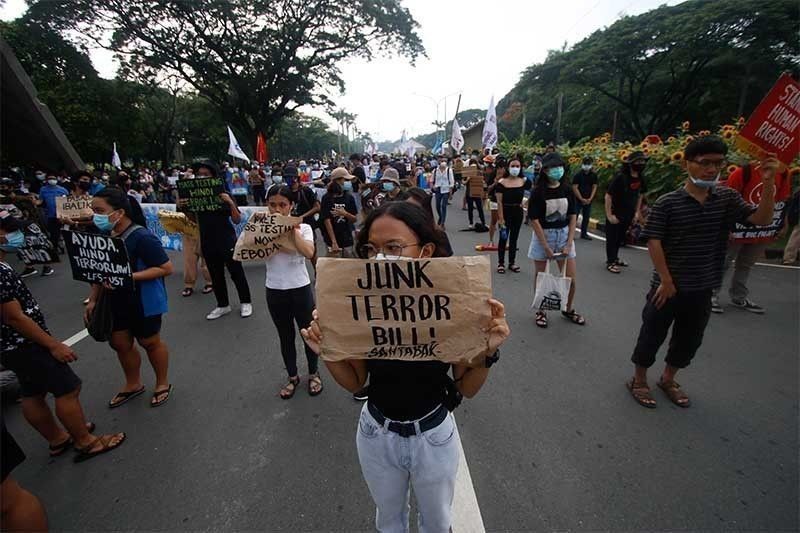With anti-terror law IRR done, time running out for SC to grant immediate relief — petitioners

MANILA, Philippines — Pressure is mounting for the Supreme Court to act on petitioners’ prayer for immediate relief against the Anti-Terrorism Act of 2020 as the much feared law's implementing rules and regulations are set to be published within the week.
“We plead the Court to decisively act on our prayer for a status quo ante order before the events and incidents overcome or pre-empt us all again and belatedly just look retrospectively in regret and chagrin,” National Union of Peoples Lawyers president Edre Olalia, counsel for some of the petitioners against the law, said Thursday.
Justice Secretary Menardo Guevarra said that the Anti-Terrorism Council has approved the IRR of the law on October 14. These guidelines will take effect upon publication and registration with the Office of the National Administrative Register of the University of the Philippines.
The anti-terrorism law is facing 37 legal challenges at the Supreme Court, with the first petition filed a day after President Rodrigo Duterte signed the law on July 3. But the SC has yet to rule on most of the petitioners’ prayer for a status quo ante or temporary restraining order to halt the law’s implementation.
SC justices have also yet to announce when they will hold oral arguments on the petitions.
READ: Cheat sheet on the looming legal battle on the anti-terrorism law
Olalia pressed: “The die is cast so we should be more wary and vigilant against the pernicious consequence of legalization and legitimization of already ongoing abuses and excesses by the authorities on our human rights.”
Amnesty International Philippines Section Director Butch Olano for his part said that the law remains vague, and raised concerns on the role of the Anti-Terrorism Council. “The law remains a threat to human rights, and disproportionately limits basic freedoms,” he added.
‘If law falls, IRR falls’
The DOJ said in a statement that the Anti-Terrorism Council “revisited the Constitution, prevailing laws, other implementing rules and regulations, jurisprudence, even the Rules of Court” in preparing the law’s IRR.
It added that the IRR seeks to explain “what a citizen must do — or must not do — to comply with the law,” an issue raised by the several petitioners in assailing the law for being vague and overbroad.
But Guevarra explained that the IRR does not, in any way, amend the anti-terrorism law. “If the law falls, the IRR automatically falls, no leg to stand on,” he told reporters.
Sen. Panfilo Lacson, author of the law, said earlier this week that a suspected Indonesian suicide bomber arrested in Sulu last weekend may serve as a potential test case of the anti-terrorism law.
Guevarra agreed with Lacson. “This is the first major case, I think, where certain persons suspected of being foreign terrorists are being charged of violating our new anti-terrorism law,” he said.
- Latest
- Trending

































